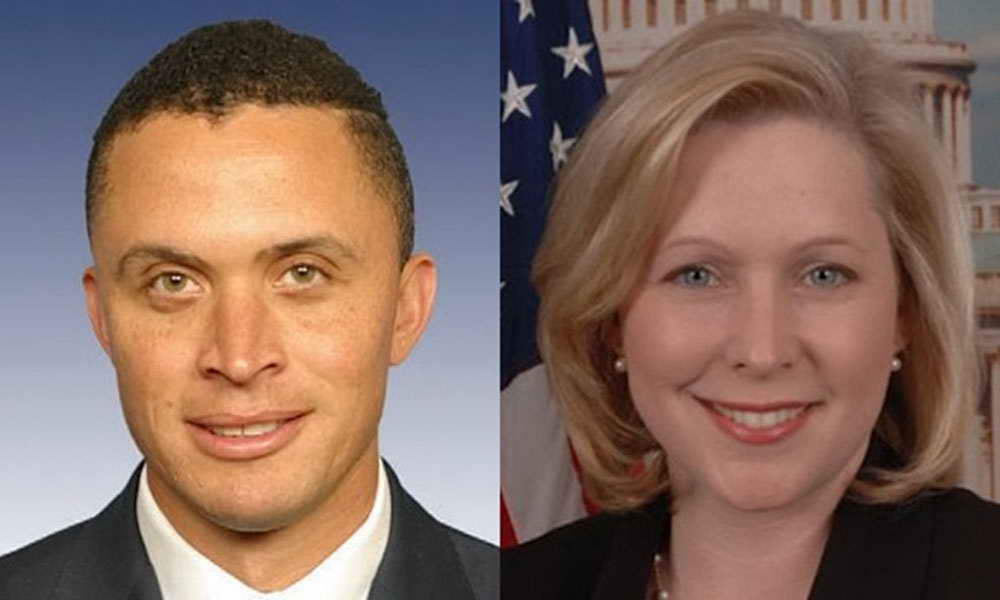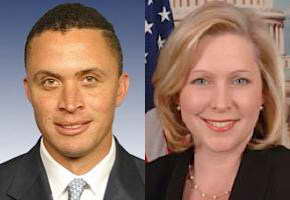January 15, 2010
1/15: Dems Duke It Out for U.S. Senate Race in NY State
Since news surfaced that former Tennessee Congressman Harold Ford Jr. is thinking about challenging fellow Democrat Kirsten Gillibrand for U.S. Senate in New York, politicos statewide and nationally have been in a frenzy. But, does the relative newcomer to New York politics, Ford, pose a serious threat to the unelected Gillibrand? The answer is, “Maybe.”
43% of registered Democratic voters in New York State say they would back Gillibrand in this fall’s Democratic primary while 24% would cast their ballot for Ford. Although Gillibrand has a double-digit lead over Ford, a notable proportion — 33% — are unsure about whom they’d support.
“Gillibrand has an early lead, but she still has a lot of ground to cover,” says Dr. Lee M. Miringoff, Director of Marist Institute for Public Opinion. “She’s below 50% against Ford, and a third of Democrats is undecided. Her approval rating among Democrats statewide is only 31%.”
How does the hypothetical race shape up by region? In Gillibrand’s backyard — upstate New York — she garners 50% compared with 23% for Ford. In heavily Democratic New York City, Gillibrand has the edge with the support of 41% of Democratic voters while Ford receives 25%. And, in the suburbs, Gillibrand receives 38% to Ford’s 19%. But, 34% of city Democrats are undecided, and 43% of suburban Democrats haven’t picked sides.
Table: 2010 Gillibrand/Ford Matchup
Click Here for Complete January 15, 2010 NYS Poll Release and Tables
What Matters to New York Democrats?
When it comes to the race for U.S. Senate in New York, what resonates with Democrats? For one, electability is a factor when determining the candidate for whom to vote. A majority — 54% — say they are more likely to vote for a candidate who has a better chance of beating the Republican candidate in November’s general election. 42% say electability makes no difference when selecting a candidate, and just 4% report it makes them less likely to vote for a candidate.
President Barack Obama’s backing also impacts New York Democrats’ vote. Although 45% of Democratic voters in New York State report Obama’s backing makes no difference when selecting a candidate, the same proportion — 45% — says a nod from the president will make them more likely to vote for that candidate. This includes 51% of Gillibrand supporters but only 33% of Ford backers who believe the president’s opinion matters to them. 10% of Democrats overall are less likely to vote for a candidate who has Obama’s support.
Harold Ford Jr.’s place of residence has been under the media’s microscope during the past week. So, does a candidate’s hometown matter to Democratic voters in New York? When it comes to whether a candidate should be from New York State, 48% report it makes no difference to them while 43% say it will make them less likely to vote for a candidate who is not from New York. 9%, however, are more likely to vote for a so-called, “carpetbagger.”
Even though about 55% of the Democratic primary vote is likely to come from New York City, the region within New York State from which a candidate hails makes little difference to Democratic voters. 67% of Democrats statewide say it doesn’t matter to them if the Democratic nominee comes from upstate including about three-quarters of Democrats who live in New York City and its suburbs. 18% are more likely to vote for such a candidate while 15% are less likely to vote for a candidate who lives north of New York City and its suburbs.
Nearly two-thirds of Democrats in New York State say a candidate who is more conservative than most Democrats in the state can still get their vote. This includes 42% who report it makes no difference to them if a candidate is more conservative and 23% who say they would be more likely to vote for a candidate who is more conservative than most Democrats in the state. 35%, though, would be less likely to vote for such a candidate.
Both Gillibrand and Ford are “evolving” their issue positions to run statewide in New York. But, that’s not a concern for a majority of the state’s Democrats. 52% say it makes no difference to them if a candidate changed his or her position on issues to run for statewide office. Still, 34% would be less inclined to support such a candidate while 14% would be more likely to do so.
Table: Candidate’s Electability
Table: Obama’s Support of Candidate
Table: Candidate from Outside of NYS
Table: Candidate from Upstate NY
Table: Conservative Democrat
Table: Candidate’s Consistency on Issues
Independent Voice vs. Team Player
A majority of New York State Democrats – 56% — think it is more important for their senator to work closely with the Democratic Congressional leadership than to be an independent voice in Congress. 44%, on the other hand, believe it is more important for their U.S. Senator to be independent.
64% of Democrats who support Gillibrand are looking for a candidate who will work closely with the Democratic leadership in Congress. In contrast, nearly six in ten – 58% — of Democrats who back Ford want a candidate who will be an independent voice.
Table: Independent Voice vs. Works with Democratic Leadership
Gillibrand Favorable to Nearly Five in Ten … Ford Unknown To Majority
48% of Democratic voters statewide view Kirsten Gillibrand favorably while 20% have an unfavorable impression of her. 32% have either never heard of the senator or are unsure how to rate her.
Her potential opponent for the Democratic nomination has a lot of work to do if he wants to become a household name in the state. When it comes to Democrats’ impressions of Ford, a whopping 52% have either never heard of him or are unsure how to rate him. 34%, though, have a positive view of Ford while 14% have an unfavorable impression of him.
Table: Gillibrand Favorability
Table: Ford Favorability
Related Stories:
1/15: Gillibrand Approval Rating Still Low
The Marist Poll’s Lee Miringoff discusses how Ford and Gillibrand will try to win over New Yorkers:


